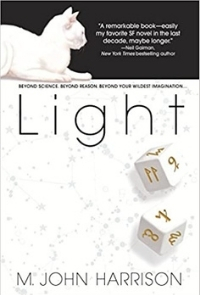
Light
Written by: M. John Harrison
Reviewed by: Brad Williamson
Genre: Science-Fiction
Score: 4.5/5
“Light” is not a normal book. It is not an easy book, either, but it is amazing in many ways. It is also frustrating, but it deals out a good kind of frustration, an extraordinarily rare feeling for a reader. It’s challenging yet short, confusing yet focused, beautiful but hideous, and totally awe-inspiring despite its shortcomings, unsatisfactory plot holes, and unresolved details.
Though different themes might appear obvious to various readers, to me the book was about the permanence of pursuit; whether you’re being chased or searching for something yet undiscovered, this act of pursuit permeates our human lives, the natural world, all imagination, and the entire hive mind of the universe. This mere act is vital to growth, emotion, and connection, because without it we would be going nowhere. It’s the book’s explanation as to why life is not easy, but also why it might be worth living.
Harrison employs what initially seems a complex plot structure. As the novel unfolds, however, the alternating viewpoints quickly become one of the least confusing aspects of the story. Usually with books that alternate chapters between several characters, I find myself enjoying one more than the others, or disliking one so much it hinders my enjoyment of the others. In “Light” all three story lines are equally exciting and fulfilling.
His prose and imagery is often uniquely gorgeous, but it can be difficult to absorb and follow everything. Definitely not a novel to be read in one evening, its many tiny details and powerful paragraphs become more meaningful and memorable as you read one or two chapters at a time. It almost feels like a collection of dense, connected short stories, and it reads like this as well.
The protagonists, if you can call them this, are all anti-heroes, another aspect that sets “Light” apart from almost any other story. Despite their truly despicable natures, they’re likable. Maybe the book is telling us that we’re pursuing both good and evil within our lives, and so we like them. Or maybe that’s just what it tells me. Or maybe it’s not actually saying anything and I’m just looking too deeply into what is otherwise a crazy, extravagant novel. These lingering questions regarding the true themes and meanings of the book’s characters and events lead me to respect the story even more.
Still, the book wasn’t perfect–or maybe it was, and the imperfections are necessary for true perfection. This seems like a stance that the book would promote if it could speak directly to us.
Highly recommended for any science-fiction enthusiast or experienced reader.
Recent Comments